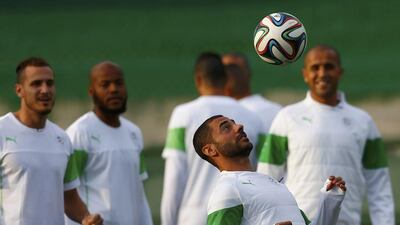Muslim players in World Cup teams who have qualified for the second round in Brazil face a difficult decision: whether to take part in the dawn-to-dusk Ramadan fast.
The decision is trickiest for the Algerian team, who face a formidable German side on Monday. Muslims can also be found on the Nigerian and French teams, and they will have to weigh their religious convictions against the possible effects on their performances of fasting.
“We need to discuss it among ourselves,” the Algerian player Djamel Mesbah said. “It’s clear that our religion is very important for the team, so we will talk about it and see how to go forward.”
For more World Cup stories, visit our dedicated microsite – thenational.ae/worldcup.
Athletes in the Olympics in 2012 faced the same hurdle, with many teams allowing their players to choose and many of them deciding to eat during Ramadan so as not to impair their performance and make up for it at another time, or make donations to charity.
While fasting during daytime over the 30 days of Ramadan, including abstaining from drinking liquids, is mandatory for all able-bodied Muslims and one of the five pillars of Islam, there are exemptions, including for the sick, pregnant, infirm or elderly. Those travelling or going to war are also excluded, and it is under this provision that most athletes will delay the fast until a more suitable time.
Madjid Bougherra, Algeria’s captain, pointed out in interviews with the Algerian press that it is a challenge Muslim players in European clubs have long faced and, when he was with Glasgow Rangers, he fasted but made sure he kept his performance up.
“The hardest thing is staying hydrated, but it’s OK. The weather’s good here,” he said. “Some players will postpone their fast for another time, but depending on my physical condition, I think I will do it.”
Bacary Sagna, a Muslim player on the French squad, said that many of the players who do it are conditioned to it from their time in the European leagues and able to function.
“As a Muslim, I know that there are certain rules that allow us to avoid it,” he said. “Personally, I’m not going to do it. Everyone’s free to do as they will and I totally respect those that will do it.”
From a religious standpoint it becomes a bit more complex. Islam lacks a central hierarchy like the Catholic church, and any imam can issue an opinion that is then obeyed, depending on how much respect they command.
Even in Algeria, which has been bathing in the euphoria of qualifying for the second round of the World Cup for the first time, a range of opinions have been expressed by religious scholars, with some coming out strongly against fasting exemptions.
“It is not allowed for an Algerian player to avoiding fasting just for a game. They must fast because God is with those who fast, and young people can fast and play at the same time,” said Mohammed Mekerkab, the head of Algeria’s association of religious scholars.
He also dismissed the exemption for travel claimed by most athletes since the provision was only for voyages undertaken in the search for knowledge, health reasons or war.
Algeria’s government-appointed High Islamic Council has come down in favour of those wanting to delay their fast. Sheikh Mohammed Sherif Kaher, the head of the body’s commission for religious opinions said, “those playing can abstain from fasting”.
Dr Hakim Chalabi, a specialist in sports and fasting who accompanied the team to Brazil, conceded in an interview that it is a delicate question because of the need for hydration and the increased risk of injuries.
He noted, though, that fasting is not always a hindrance to players.
“We are often asked to urge players not to fast but, oddly, in some cases, there are athletes that get better results during Ramadan because they are fasting and want to,” he said. “It can be a spiritual and psychological aid.”
sports@thenational.ae
Follow us on Twitter at @SprtNationalUAE

